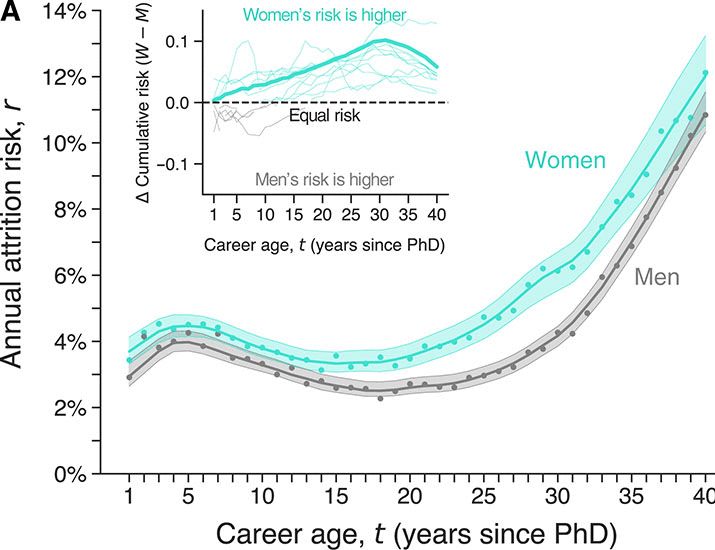Karl Magnus Møller
Thanks so much for coming and giving a great talk and great feedback on the dissertation. I much enjoyed it!
Link to the dissertation:
politica.dk/politicas-ph...
12.04.2025 10:16 — 👍 1 🔁 1 💬 0 📌 0
Such a pleasure and learning experience to have Federica in Aarhus yesterday to examine Karl Møller’s dissertation together with Wiebke Junk. Thanks for coming!
Great discussions on a great dissertation.
I special day for me as the main supervisor!
12.04.2025 10:13 — 👍 8 🔁 1 💬 0 📌 0
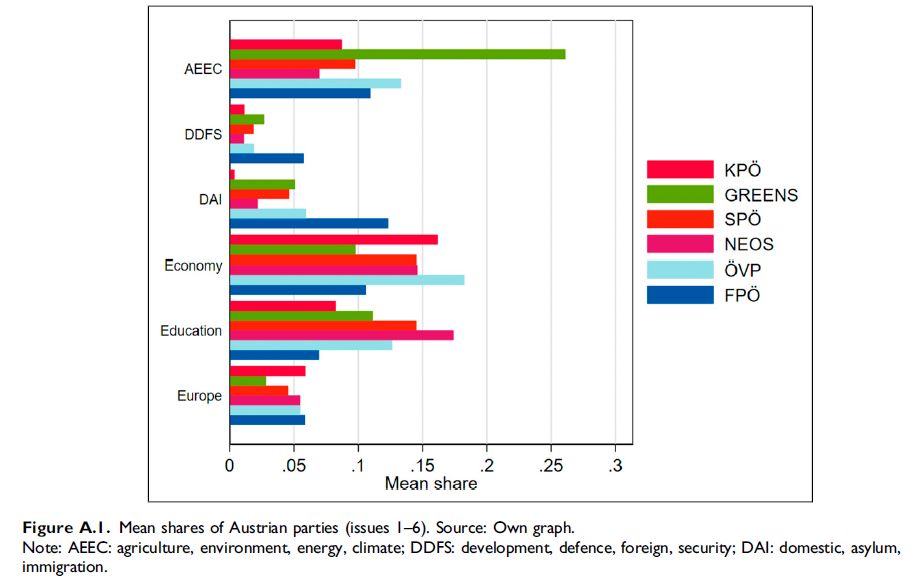
Figure A.1. Mean shares of Austrian parties (issues 1–6). Source: Own graph. Note: AEEC: agriculture, environment, energy, climate; DDFS: development, defence, foreign, security; DAI: domestic, asylum,
immigration.
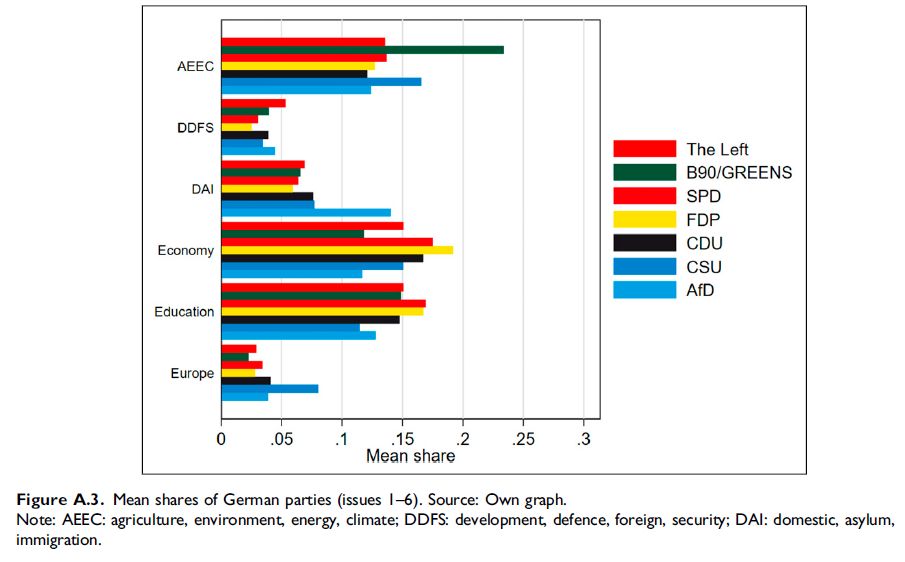
Figure A.3. Mean shares of German parties (issues 1–6). Source: Own graph. Note: AEEC: agriculture, environment, energy, climate; DDFS: development, defence, foreign, security; DAI: domestic, asylum,
immigration.
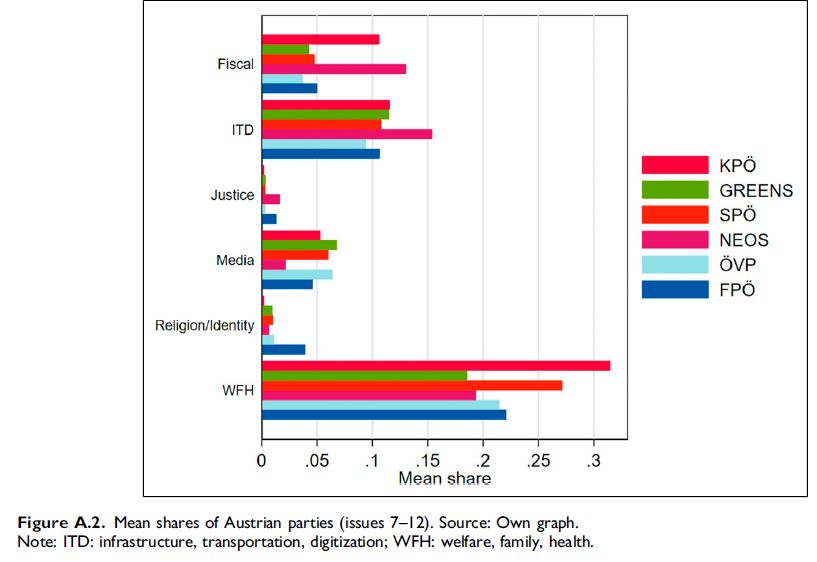
Figure A.2. Mean shares of Austrian parties (issues 7–12). Source: Own graph. Note: ITD: infrastructure, transportation, digitization; WFH: welfare, family, health.
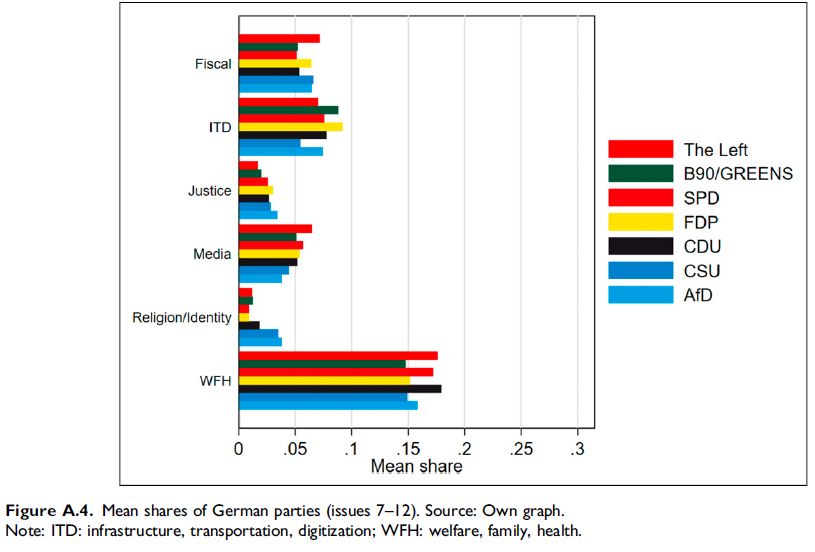
Figure A.4. Mean shares of German parties (issues 7–12). Source: Own graph. Note: ITD: infrastructure, transportation, digitization; WFH: welfare, family, health.
Subnational party organisations stick to the issue ownership of their national parties (we expand the data by @henrikseeberg.bsky.social to the subnational level).
For example, Greens devote more attention to the issue "agriculture, environment, energy, climate" than other parties in 🇦🇹 & 🇩🇪.
14.03.2025 09:43 — 👍 2 🔁 1 💬 2 📌 0
Great work!
14.03.2025 16:16 — 👍 1 🔁 0 💬 1 📌 0
Hope to see you in Konstanz for CAP and cold German beers!
06.03.2025 21:13 — 👍 0 🔁 0 💬 0 📌 0
That was on my wish list, and still is! Just had too much going on already.
06.03.2025 21:08 — 👍 0 🔁 0 💬 1 📌 0
Thanks European Inst at LSE @lse-ei.bsky.social for a great time!!
06.03.2025 21:01 — 👍 8 🔁 1 💬 1 📌 0

Above all, I enjoyed showing & sharing the city I love w my parents, kids & @mbechseeberg.bsky.social. It has a beer tap, coffee brewer & play ground on every corner not to mention its outstanding museums.
06.03.2025 20:57 — 👍 5 🔁 0 💬 0 📌 0

I was lucky to present my research at European Inst. LSE, Nuffield College in Oxford & Essex, & was spoiled w great feedback, coffees, lunch+dinners w @tabouchadi.bsky.social Rachel Bernard, Jane Green, Lawrence Ezrow, @dianebolet.bsky.social & @roizur.bsky.social.
What a community to be part of!
06.03.2025 20:57 — 👍 5 🔁 0 💬 3 📌 0
Such a privilege to be back as visiting fellow at the place I did my masters 15 years ago. 2/
06.03.2025 20:57 — 👍 2 🔁 0 💬 1 📌 0

A truly amazing time & research stay w my family in London is soon coming to an end. Incredibly grateful for warm hospitality & lots of fun lunches, coffees and discussions at LSE with @miguelpereira.bsky.social, @sarahobolt.bsky.social,
@florianfoos.bsky.social. 1/
06.03.2025 20:57 — 👍 20 🔁 0 💬 3 📌 1
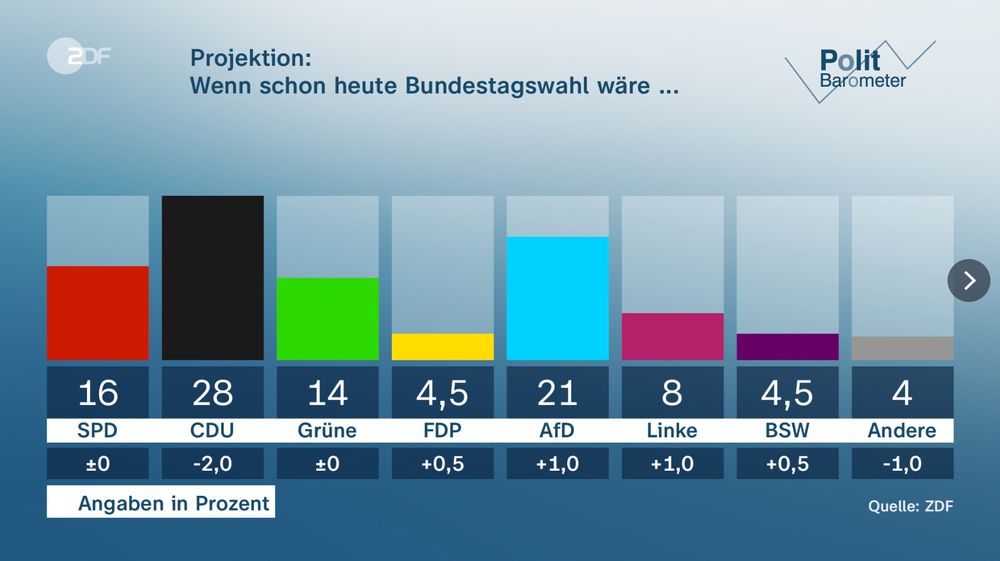
Some thoughts and pointers on the upcoming German elections on Sunday. Nearly all polling institutes have released final polls in the last days that show a very similar picture. It is nearly certain that the CDU/CSU will come out on top and Friedrich Merz is going to be the next Chancellor. 1/
21.02.2025 10:32 — 👍 128 🔁 51 💬 7 📌 4
🔥🔥🔥
10.02.2025 13:47 — 👍 0 🔁 0 💬 0 📌 0
Important position to fill at EJPR
31.01.2025 17:46 — 👍 1 🔁 0 💬 0 📌 0
This is a pretty cool study! 😉
31.01.2025 11:27 — 👍 3 🔁 0 💬 0 📌 0
Our article “Which Information Do Politicians Pay Attention To? Evidence from a Field Experiment and Interviews” (w/ @henrikseeberg.bsky.social ) is part of the latest @bjpols.bsky.social issue.
This was such a fun project to work on, and I learned a lot from it.
OA Link: doi.org/10.1017/S000...
20.01.2025 15:44 — 👍 23 🔁 2 💬 0 📌 0
Thanks for the kind words, Hugo.
Indeed very exciting to see this paper on youth wing influence in political parties online at Journal of Politics.
First output from the 4-year YOUTHPOL project on the same topic. Much more to come..
10.01.2025 13:00 — 👍 4 🔁 1 💬 0 📌 0
We all know the amazing work of Weber and De Sio on ‘Issue Yield’. But few use it concretely beyond the appealing logic of bridge issue to cater to core & potential voters. I provide a simpler & more applicable way forward on this logic by using a split in issue ownership to select campaign issue👇🏼
08.01.2025 08:54 — 👍 2 🔁 1 💬 0 📌 0

On 8-9 April, I will be organizing LoPaPol, a conference specifically on Local Party Politics in Leiden. If you are working on research on the role of parties in local politics, please come and visit us! fd24.formdesk.com/universiteit...
07.01.2025 09:49 — 👍 8 🔁 6 💬 0 📌 1
Yet, only a minor part of issue ownership is endogenous & we gain analytical leverage by splitting issue ownership into an endogenous and non-endogenous part. See thread 👆👇
2/2
07.01.2025 08:39 — 👍 0 🔁 0 💬 0 📌 0
Recent research questions political parties' issue ownership & its use to understand parties, voters & elections because a person's issue ownership choice correlates with his party preference..
1/2
07.01.2025 08:39 — 👍 0 🔁 0 💬 1 📌 0
Thanks a ton to Christoffer Green-Pedersen, Rune Stubager, Rune Slothuus, Jonas Lefevere, Stefaan Walgrave, Rens Vliegenthart, Frederik Hjort, Sofia Marini, and Stuart Soroka for great comments on previous versions of the WP
02.01.2025 17:51 — 👍 0 🔁 0 💬 0 📌 0
Link to WP (in the working paper section): www.henrikbechseeberg.com/publications
02.01.2025 17:51 — 👍 0 🔁 0 💬 1 📌 0

Publications by Henrik Bech Seeberg
Publications and research output by Henrik Bech Seeberg
This study might help scholars further push and sharpen our understanding of issue ownership, issue competition and parties issue strategies; provide a better understanding of elections and vote transfers between parties; and help parties pick the right campaign issues..
02.01.2025 17:51 — 👍 0 🔁 0 💬 1 📌 0
..much greater on the environment, families and the EU (core < potential) than on the economy & health.
Finally, issue competition is less dynamic in the US (core > potential) than in Western Europe.
02.01.2025 17:51 — 👍 0 🔁 0 💬 1 📌 0
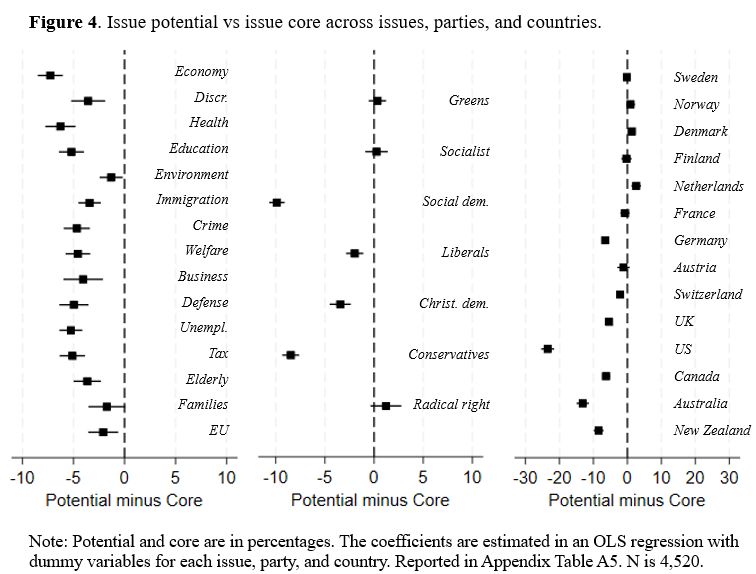
Interestingly, the core-to-potential ratio differs substantially across issues, parties, and countries.
Social democrats e.g. generally have a firm hand on their voters, but limited growth potential.
The electoral growth opportunities for parties across issues is generally..
02.01.2025 17:51 — 👍 0 🔁 0 💬 1 📌 0
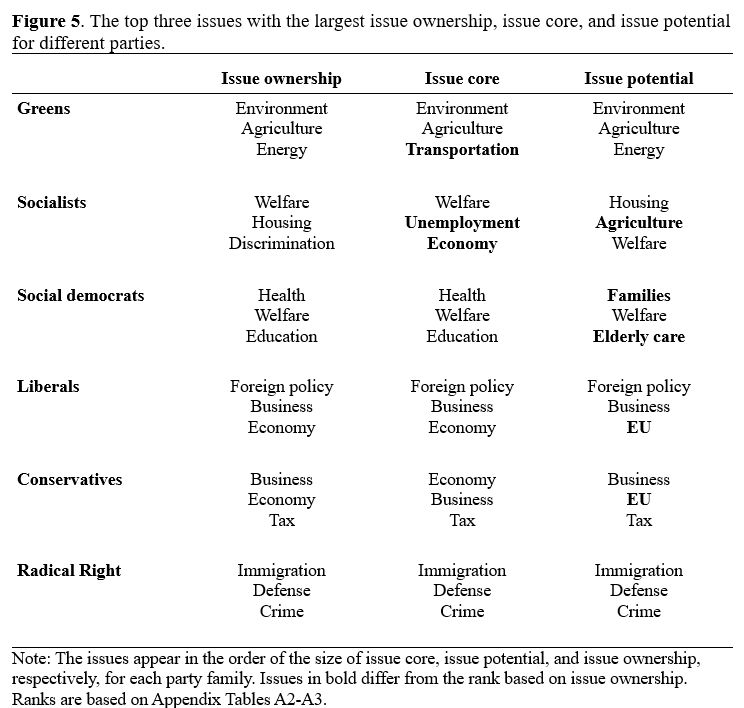
..in 14 countries over 50 years using 100+ national election studies.
This matters to parties' issue strategies:
Socialist parties e.g. should emphasize welfare, unemployment and the economy to target core voters, and housing, agriculture, and welfare to attract potential voters!
02.01.2025 17:51 — 👍 0 🔁 0 💬 1 📌 0
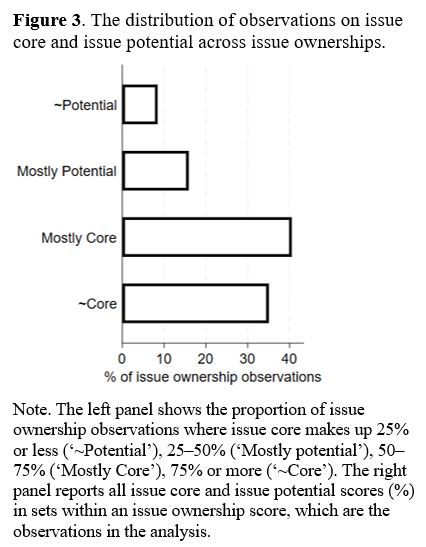
vote for the party, or 'issue potential' that consists of potential voters who find the party most competent but do not vote for the party.
So the party might emphasize an issue to attract new voters but in fact only talk to core voters.
I use 4,000,000 obs. to split issue ownership on 20 issues..
02.01.2025 17:51 — 👍 0 🔁 0 💬 1 📌 0
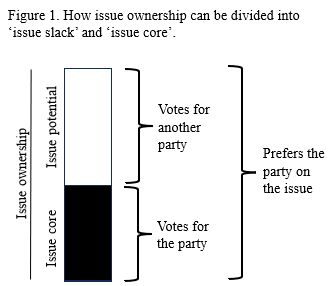
..parties pursuing their issue ownerships unknowingly often target either their core voters or their potential voters.
In almost half of the 4,500 issue ownerships in my data, issue ownership is either entirely 'issue core' & consists of core voters who find the party most competent &..
02.01.2025 17:51 — 👍 0 🔁 0 💬 1 📌 0
Economics (Kingston U.), also interested in History and Politics
Professor Digital Media & Society • Wageningen University & Research • Strategic Communication (COM) group • ERCStG • NWO VIDI
Professor of Comparative Democratic Institutions, Nuffield & University of Oxford, FBA. http://benansell.substack.com. BBC Reith Lecturer 2023. Host BBC Radio 4 Rethink. Columnist for Prospect. Director, Centre for Advanced Social Science Methods (CASSM).
PhD Student in Political Science at Aarhus University.
Fond of Data Viz and Sports.
https://lucascoutoz.netlify.app/
PhD candidate - Sciences Po, working on political parties, computational social science and climate politics / https://malojan.github.io/website/
PhD Student Political Science Aarhus University | Interested in Political Parties & Issue Competition | prev. MA Social Sciences HU Berlin, BA Political Science FU Berlin, student assistant Manifesto Project at WZB Berlin, methods chair FU sociology dept
Postdoc in Pol. Science at Uni Salzburg | elections | public opinion | EU | globalization | social media editor @politiqueue.bsky.social | Formerly Qualidem & DeVOTE | FR CZ BE AT
Welcome to the official account of the LSE European Institute, one of the largest centres for the study of Europe in the world. Follow for news, public events & more. http://lse.ac.uk/ei
Political Scientist/Psychologist • Assistant Professor at Radboud University 🇳🇱 • Research Fellow at Leibniz University Hannover 🇩🇪 • Generational differences in vote choice (Veni) • Political polarization over facts and science (Vidi, Horizon Europe)
PhD Student @dynamics.bsky.social @humboldtuni.bsky.social | Political behavior, party competition, far right | Previously @sciencespo.bsky.social
Professor of Political Science @ University of Salzburg 🇦🇹. Comparative politics and 🐈
🇨🇦 expat
Associate Professor of Political Science and Public Policy, Oslo Business School, Oslo Metropolitan University. Studying the political economy of gender. http://www.skorge.info
𝗖𝗼𝗺𝗽𝘂𝘁𝗮𝘁𝗶𝗼𝗻𝗮𝗹 𝗣𝗼𝗹𝗶𝘁𝗶𝗰𝗮𝗹 𝗦𝗰𝗶𝗲𝗻𝘁𝗶𝘀𝘁
Postdoc at @uniinnsbruck.bsky.social
PhD from @unisalzburg.bsky.social
Alum of @sciencespo.bsky.social
Party Competition | Representation | Democracy | Far Right
🌐 www.fabianhabersack.com
Journalist, DR Nyheder, DR2 Deadline
Fang mig på 💌 skot@dr.dk 📱60631880
Associate professor @AalborgUni. Public administration, policing, and field experiments.
Postdoc in Political Science at University of St. Gallen | Civil Wars | Political Violence | Arms Control
PhD | Research Associate @ University of Strathclyde @parliview.bsky.social| 👩🏼💻📝 political behavior, parties, & representation, mostly in Europe | Hungarian-American 🇭🇺
www.timea-balogh.com
Postdoc in Political Science, University of Copenhagen • casually and causally studying politicians’ rewards, representation, and careers • fkjoeller.github.io
polsci | Postdoc at University of Münster, previously PhD candidate at European University Institute | radical right, justifications, gender | computational text analyses | he/him








